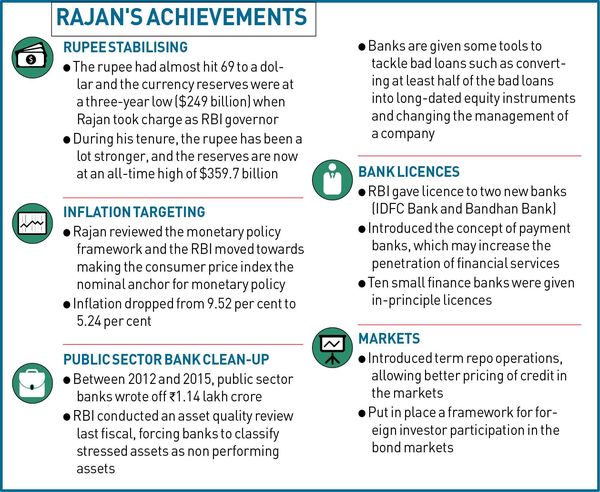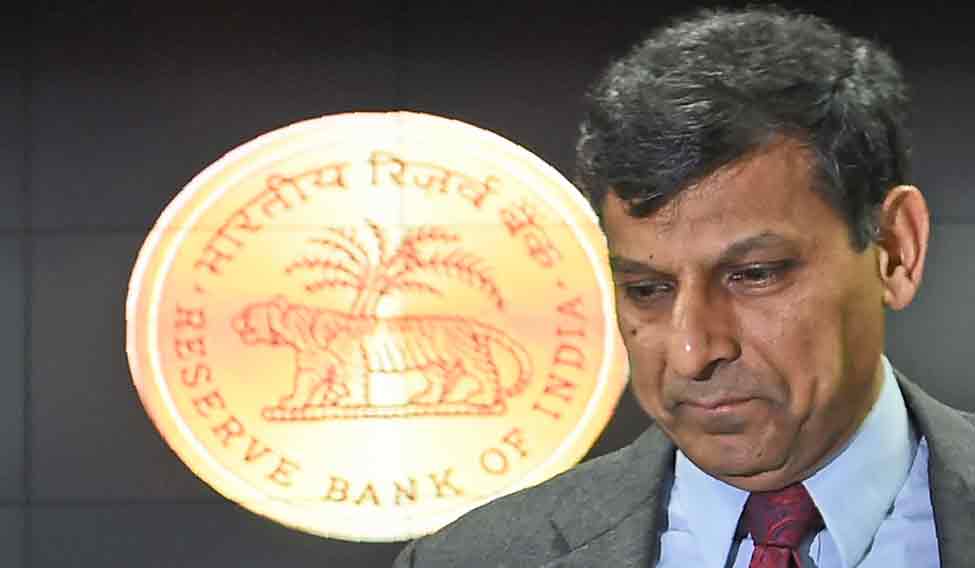The governorship of the central bank is not meant to win one votes or Facebook likes”. That was how Raghuram Rajan concluded his first speech after taking up the top job at the Reserve Bank of India. He added that many things he would do might not win him applauses.
Rajan's decision not to seek a second term, however, has generated tremendous public interest, probably for the first time for a Reserve Bank governor. Many in industry, business, banking and trade are unhappy and apprehensive about how 'Rexit'—Rajan's exit—would affect the India growth story. So much so that when the government announced a clutch of reforms on June 20, it was widely interpreted as a move to neutralise the effect Rajan's announcement could have on the capital markets.
However, there are as many people who see it as an opportunity to do things the Indian way. When Narendra Modi became prime minister in May 2014, questions were raised about the compatibility between his government and Rajan, who was appointed by the Manmohan Singh government. But the apprehensions turned out to be needless. Sources in the RBI told THE WEEK that Modi and Rajan regularly met “without the glare of the media”. The exchanges were always about the economy, “the present, the short term, the mid term and the future”.

While many BJP leaders and industry lobbies openly expressed their disappointment over Rajan's hawkish stand, Modi and Finance Minister Arun Jaitley avoided comment. This was despite Jaitely asking for a rate cut on more occasions than one. The RBI wanted a demonstration of fiscal discipline on the part of the government: the government should not borrow to spend, and fritter away money on interest payment. Subject to that and taming of consumer price index (CPI), the rates would be slashed, the finance ministry was told.
Rajan had, from the very beginning, held that CPI, which affects the lives of the poor, was part of the RBI's concern. The government and BJP think-tanks said monetary policy stance could not alter the rising consumer prices, as it was on account of shortage. They wanted interest rates to be slashed on the strength of falling wholesale price index. Rajan did not budge.
“The middle class and the small and medium enterprises form the core support base of the BJP; they were systematically credit starved. Rajan is a good economist, but not a good Indian economist,” said M.R. Venkatesh of the Swadeshi Jagaran Manch.
It seemed good enough a reason for the government and Rajan to fall apart. Not really. Modi reportedly described Rajan as someone from whom he learnt a lot. And Rajan believed his commitment was translating Modi's words into actions on the ground.
On May 16, Jaitely spoke about the relationship between the Reserve Bank and his ministry. “We have an institutional relationship. It is a mature one. We discuss everything at the highest level and consider each other's views,” he said. What necessitated this explanation was BJP MP Subramanian Swamy's demand that Rajan be denied a second term. Swamy was of the view that by not slashing interest rates, Rajan had acted against the small and medium enterprises in India, “and thus, is anti-national”.
Rajan, who had brushed aside any political ambition—saying his wife, the key decision maker, said no—responded to Swamy's attack in his own way. He had lots to do, he said the next day. Though Jaitley said he did not approve of any personal comments “on anybody, let alone the RBI governor”, a section of the BJP started airing their displeasure over some speeches and lectures that Rajan had made.
That he foresaw the 2008 global financial meltdown is not the only reason for Rajan's popularity. As he entered the Indian scene as an adviser to Manmohan Singh in 2012, and rose to be the chief economic adviser and then RBI governor, he impressed a large section of the intelligentsia, the youth and the corporate world with his ideas, speeches and lectures. He did not confine himself to monetary policy, but touched contemporary life, economy, society and world. He spoke with conviction and did not mince words.
Some BJP leaders took exception to what they saw as “criticism of the government”. They cite a speech in the course of which Rajan pointed out that export-led growth would not be as easy as it was in the past as the world today does not have the capacity to accommodate another China. He suggested make for India by creating the strongest sustainable unified market. In another speech, he spoke on “democracy, inclusion and prosperity” and mentioned the Emergency and Hitler, and concluded that strong governments might not move in the right direction.
What made the right wing really angry was his convocation address at IIT Delhi. It was at a time when a debate on tolerance was raging across the country. Rajan concluded the brilliant speech tracing India's tradition of tolerance and what campuses should do to nurture it. “Tolerance means not being so insecure about one's ideas that one cannot subject them to challenge—it implies a degree of detachment that is absolutely necessary for mature debate. Finally, respect requires that in the rare case when an idea is tightly associated with a group's core personality, we are extra careful about challenging it”.
 Sharp shooter: Raghuram Rajan successfully reined in inflation during his tenure | Reuters
Sharp shooter: Raghuram Rajan successfully reined in inflation during his tenure | Reuters
Around the same time, Rajan was doing what many bankers say is not just difficult, but a dirty job—cleaning up the bad debt of public sector banks. Between 2012 and 2015, PSBs wrote off Rs 1.14 lakh crore—mostly loans given to corporate houses that were defaulting in repayments. Rajan wanted the banks to provision for such defaults at the time of giving loans, thus making things tough for the banks that were not only showing the interest not recovered as loans, but also paying tax on that as well.
As Swamy's attacks continued, there were whispers in the party that Rajan did not “fit into the BJP scheme of things”. Party president Amit Shah said it was Swamy's view, and not his—his was the party's official stand. Even as support for Rajan getting a second term grew in the media he sent an email to his colleagues at the RBI about his decision to return to teaching. He suggested in the letter that he took the decision after discussions with the government.
While both Rajan and the government are silent on what triggered his decision not to seek a second term, reports present two different stories. The first that Rajan was keen on a shorter second tenure and not a full term, but the government wanted someone for the full term. The second was the possibility of the government considering other applicants, effectively making Rajan apply for the job!
Rajan's successor will clearly be someone more amenable to acting on the directions from the South Block, enabling the BJP to keep its constituency and financiers happy but without fumbling on India's position and image in the global context. He will have to keep foreign direct investments flowing in and provide cheap bank loans to convert India into a manufacturing hub with a high level of job creation. Simultaneously, he will have to clean up NPAs of public sector banks and keep the inflation low. The BJP's tacit support to those who are opposed to Rajan's speeches and the prime minister's periodic reminders to his flock not to speak to the media suggest that the next governor will confine his lectures to his job.
India's best known investor Rakesh Jhunjhunwala says India's fundamentals are strong and nothing will change with the exit of Rajan. But, apparently, it will if his legacy is short changed. As the government begins its search for the man who will step into Rajan's big shoes, any shift in the effort to clean up the public sector banks will be construed as a victory of the crony capitalists who will be happy to be rid of Rajan.







